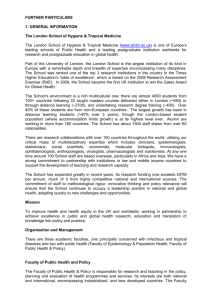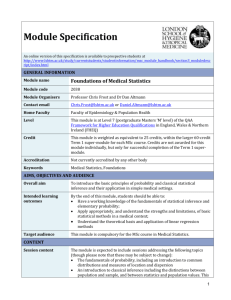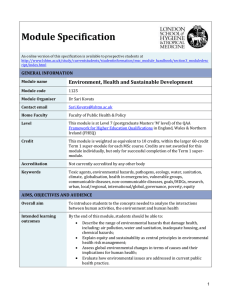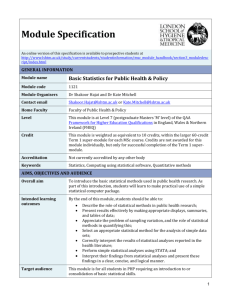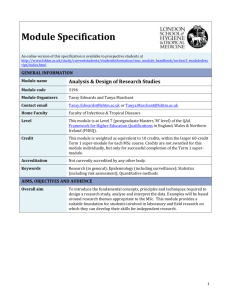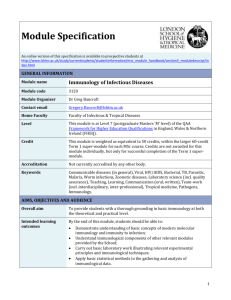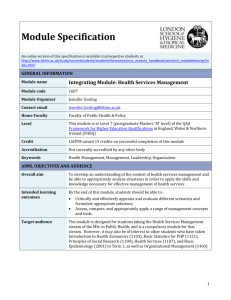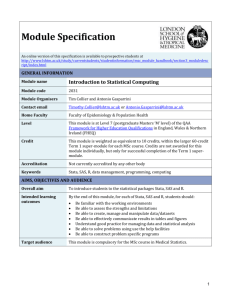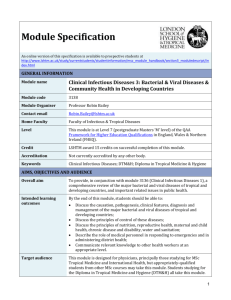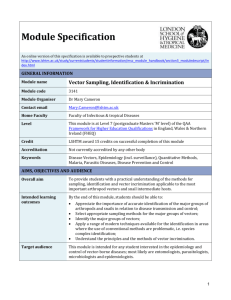3125 Introduction to Disease Agents and Their Control Module
advertisement
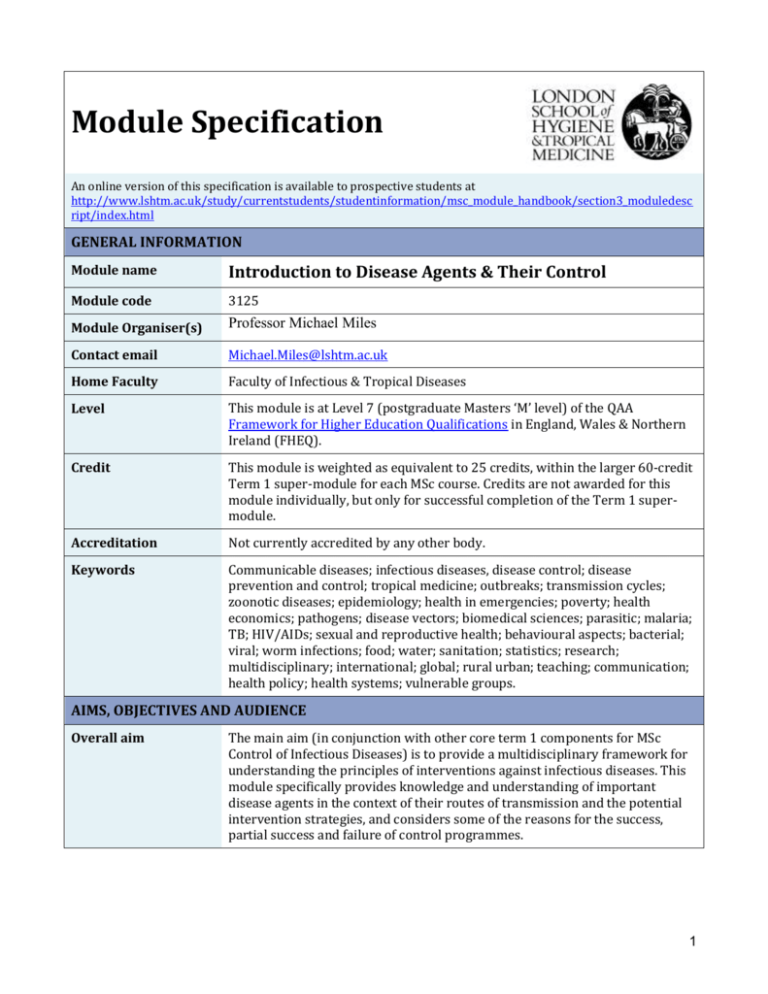
Module Specification An online version of this specification is available to prospective students at http://www.lshtm.ac.uk/study/currentstudents/studentinformation/msc_module_handbook/section3_moduledesc ript/index.html GENERAL INFORMATION Module name Introduction to Disease Agents & Their Control Module code 3125 Module Organiser(s) Professor Michael Miles Contact email Michael.Miles@lshtm.ac.uk Home Faculty Faculty of Infectious & Tropical Diseases Level This module is at Level 7 (postgraduate Masters ‘M’ level) of the QAA Framework for Higher Education Qualifications in England, Wales & Northern Ireland (FHEQ). Credit This module is weighted as equivalent to 25 credits, within the larger 60-credit Term 1 super-module for each MSc course. Credits are not awarded for this module individually, but only for successful completion of the Term 1 supermodule. Accreditation Not currently accredited by any other body. Keywords Communicable diseases; infectious diseases, disease control; disease prevention and control; tropical medicine; outbreaks; transmission cycles; zoonotic diseases; epidemiology; health in emergencies; poverty; health economics; pathogens; disease vectors; biomedical sciences; parasitic; malaria; TB; HIV/AIDs; sexual and reproductive health; behavioural aspects; bacterial; viral; worm infections; food; water; sanitation; statistics; research; multidisciplinary; international; global; rural urban; teaching; communication; health policy; health systems; vulnerable groups. AIMS, OBJECTIVES AND AUDIENCE Overall aim The main aim (in conjunction with other core term 1 components for MSc Control of Infectious Diseases) is to provide a multidisciplinary framework for understanding the principles of interventions against infectious diseases. This module specifically provides knowledge and understanding of important disease agents in the context of their routes of transmission and the potential intervention strategies, and considers some of the reasons for the success, partial success and failure of control programmes. 1 Intended learning outcomes By the end of this module, students should be able to: Target audience Describe the importance of principal major pathogens in the different regions of the world; Outline the practicalities and limitations of diagnostic techniques for these pathogens; Apply knowledge of the life cycles of a range of pathogens to their transmission routes and pathogenesis, and to the selection of appropriate interventions; Appreciate the inter-relationships between clinical skills, laboratory science, epidemiology, and health policy in the selection of interventions; Assess the implementation of interventions and understand reasons for their success and failure; Select appropriate interventions, taking account of the diverse social, political and economic contexts in which health systems operate. This module is a compulsory core module for all students on the MSc course in the Control of Infectious Diseases. CONTENT Session content The module is expected to include sessions addressing the following topics (though please note that these may be subject to change): The life cycle and characteristics of major infectious disease agents according to their principal transmission routes, namely: respiratory (proximity) diseases; contact diseases; water-borne; food-borne; sexually transmitted; blood-borne; congenital and perinatal; arthropod vectorborne; opportunistic, or emergent infections. This will include examples of laboratory methods for identifying disease agents; The principal intervention strategies used to combat such infectious diseases, namely: case management, vaccination, treatment and chemoprophylaxis and the many means of preventing exposure, from individual protection to environmental management; Analysis of factors contributing to the success or failure of systems of control and intervention strategies will be considered including: fundamental scientific difficulties with implementation procedures, managing people and resources; contextual problems associated with finance and interagency relationships; social and political issues. TEACHING, LEARNING AND ASSESSMENT Study resources provided or required Course handbooks; reading lists; lecture handouts; electronic access to pdfs of selected PowerPoint presentations. Teaching and learning methods Teaching methods will include lectures, practicals, group discussions, debates and problem solving exercises that will build on the previous experience and future career intentions of the students. Assessment details By written examination in June (Paper 1). The Paper 1 written examination includes one section (25% of the examination marks) based on module 3125. For students who are required to re-sit, or granted a deferral or new attempt, the task will be to take the written examination in the following year. 2 Assessment dates Assessment(s) will take place as part of the written examination in June. For students who are required to re-sit, or granted a deferral or new attempt, the next assessment date deadline will be May/June of the next year. Language of study and assessment English (please see ‘English language requirements’ below regarding the standard required for entry). TIMING AND MODE OF STUDY Duration The module runs for 10 weeks at 2.5 days per week; this module runs on Tuesday afternoons, Thursdays and Fridays. Dates For 2015-16 the module will start on Tuesday 6 October 2015 and finish on Friday 18 December 2015. Timetable slot The module runs in LSHTM timetable slot Term 1. Mode of Study The module is taught face-to-face in London. Both full-time and part-time students follow the same schedule. For full-time students, other LSHTM modules are available in the remainder of the week. Learning time The notional learning time for the module totals 250 hours, consisting of: Contact time ≈ 120 hours Directed self-study ≈ 60 hours Self-directed learning ≈ 20 hours Assessment, review and revision ≈ 50 hours APPLICATION, ADMISSION AND FEES Pre-requisites A class II degree in a biological, biomedical or public health orientated topic or some equivalent experience are desirable but not essential. English language requirements A strong command of the English language is necessary to benefit from studying the module. Applicants whose first language is not English or whose prior university studies have not been conducted wholly in English must fulfil LSHTM’s English language requirements, with an acceptable score in an approved test taken in the two years prior to entry. Applicants may be asked to take a test even if the standard conditions have been met. Student numbers Student numbers are typically 30 to 40 per year; numbers may be capped due to limitations in facilities or staffing. Student selection Preference will be given to LSHTM MSc students particularly those registered for MSc Control of Infectious Diseases (for which this module is obligatory) and LSHTM research degree students. Other suitable applicants meeting the entry criteria will usually be offered a place in the order applications are received, until any cap on numbers is reached. Applicants may be placed on a waiting list and given priority the next time the module is run. Partial Registration (partial participation) by LSHTM research degree students is allowed for this module. 3 Fees For registered LSHTM MSc students, fees for the module are included within MSc fees (given on individual course prospectus pages). If registering specifically for this module, as a stand-alone short course, individual module fees will apply. Tuition fees must be paid in full before commencing the module, or by any fee deadline set by the Registry. Scholarships Scholarships are not available for individual modules. Some potential sources of funding are detailed on the LSHTM website. Admission deadlines For 2015-16: For registered LSHTM MSc students, the module choice deadline is the end of Term 1 Orientation Week, Friday 2 October 2015. If registering specifically for this module, applications may be made at any time. The School gives priority to the needs of students registering for Masters and Research Degrees, and so places on any module may be limited - early application is therefore advised. Formal registration will take place on the morning of the first day of the module. ABOUT THIS DOCUMENT This module specification applies for the academic year 2015-16 Last revised 22 August 2012 by Michael Miles; 10th July 2015 minor updates by Sarah Bathie London School of Hygiene & Tropical Medicine, Keppel St., London WC1E 7HT. www.lshtm.ac.uk 4
